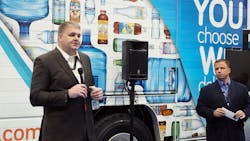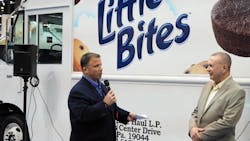Nestlé Waters, Bimbo Bakeries look to propane for savings, cleaner-running fleets
INDIANAPOLIS. Two fleets announced significant propane-powered additions to their trucks Thursday morning at the NTEA Work Truck Show, not only to lower emissions but also because "we're saving so much with these."
The fleets — Nestlé Waters North America and Bimbo Bakeries USA — chose ROUSH CleanTech for the trucks' fuel systems. ROUSH may be more familiar for its racing technology, noted Vice President for Sales and Marketing Todd Mouw: "For anybody who's driven one of our hot rod Mustangs or seen us on the NASCAR track, same company, and we've now dovetailed into producing alternative fuel vehicles for the last eight years."
As others at the conference did, Mouw touched on the current very low prices of diesel and gasoline and whether they're deflating fleets' push for alternative fuels; propane prices, however, are steadier at around $1.00 per gallon vs. the current $2.00-per-gallon approximate cost of diesel. "The theme of the show with alternative fuels, really, with oil prices and gas prices down so much, is do you guys still have a reason to be here? And the answer is yes," he said. "Our business at ROUSH in relation to propane autogas has never been stronger."
Nestlé was first up in the two-part press conference. The company's fleet will add 155 propane-powered delivery trucks — Class 6 Ford F-650s upfitted with side-load beverage bays by Mickey Body — to be deployed across the country. Provided things continue to go well with them, Nestlé will be moving toward all propane delivery trucks, anticipating as high as an 85% propane fleet replacement order within four years, the company's National Fleet Manager Bill Ardis told Fleet Owner.
These new trucks will be added to 30 Nestlé has been using since 2014, and Ardis said they not only help promote the company image and values but are designed for driver-hiring flexibility. "Overall at Nestlé globally, the goal is to get rid of diesel fuel … really, this is the solution we landed on," Ardis noted. In the company's operations and applications, "we want trucks that are flexible; they want trucks that are non-CDL, because it's very difficult to get CDL drivers; and they have to have a certain capacity."
On that note, Ardis said after the conference that Nestlé is also looking at a larger CDL-required variant of its trucks, likely Ford F-750s. He'd also pointed out earlier that ROUSH and Mickey Body spent some 18 months in developing and engineering the propane-powered F-650s — necessary because of space limitations for a propane tank on a drop-frame beverage-delivery truck — making for what's believed to be the nation's first delivery truck of its kind.
Alt fuels: One fleet's decision process
Meanwhile, Bimbo Bakeries USA (BBU) — perhaps better known on the street for its brands like Thomas', Oroweat, Entenmann's and Sara Lee — has purchased 84 Ford F59 step vans equipped with ROUSH CleanTech propane fuel technology and will operate them in three major markets.
In January, 30 new units began operating from BBU's Chicago-area location, 27 began operating from its Denver-area office and another 27 will go into service in the Washington, D.C. region this month, all as route delivery vehicles. ROUSH helped train BBU technicians on servicing the trucks.
BBU says it installed onsite fueling stations at each of the three locations, and with the fueling infrastructure costs accounted for is paying about $1.30 per gallon of propane autogas vs. $1.80 per gallon for gasoline in its vehicles using that fuel. BBU tapped incentives in both Colorado and Maryland to minimize initial costs, and each of the propane-powered F59s is expected to save approximately 100 tons of greenhouse gas emissions over the course of its use.
"I don't believe I've worked with a company that was more studious and thorough about evaluating the alternatives in choosing propane," said Tucker Perkins, chief business development officer at the Propane Education Research Council. "Don't ask me what they did; ask them."
Gary Maresca, senior director of fleet services at BBU, noted his background in engineering, manufacturing and finance and said he'd spent some three years researching the complex field of alternative fuels, explaining the fleet's rationale for going with propane. First, he noted it was important for that endeavor to have corporate support — BBU's parent, Grupo Bimbo, has a strong commitment to environmental and social responsibility — and Maresca also talked about drivers' reactions to the trucks and other nuances of the move to propane.
FROM THE FLEET: Maresca discusses BBU's decision to run propane-powered F59 delivery trucks
Schools choosing propane, too
Perkins spoke during both the press announcements, noting that school districts across the nation are switching to propane to fuel buses, which he said could spur additional uptake of the U.S.-produced fuel.
"I want you to imagine this Nestlé truck yellow, because this morning, 500,000 children rode to school in a propane-powered school bus," Perkins said. "School bus managers are either buying propane vehicles or they're getting ready to buy propane vehicles. Why do they do that?
"Most of them will tell you they did it for emissions," he continued, adding that children's pulmonary health is a one big driver. "Along the way, though, the drivers said, 'You know what? This is really good for me, too. The vehicle is quieter. When I'm driving a quieter vehicle, I know better about what's going on outside my vehicle and I know better what's going on inside my vehicle, and I'm a happier driver, too.'"
But cost savings over running diesel variants, even with the price of oil as low as it is now, are a primary driver as well, Perkins emphasized. While operational conditions vary school-to-school, he said savings to the tune of $1,000 per-bus-per-week are typically cited, but "about six months ago, though, bus dealers started talking about something even more important.
"They started talking about how many more teachers they were hiring, how many more band instruments they were putting in the band, they're fixing the roof that used to leak — because now they had money to do that."
About the Author
Aaron Marsh
Aaron Marsh is a former senior editor of FleetOwner, who wrote for the publication from 2015 to 2019.

